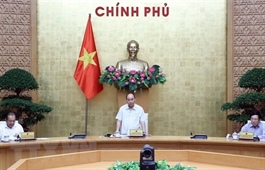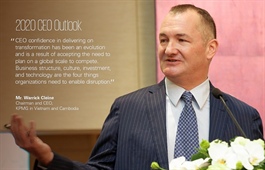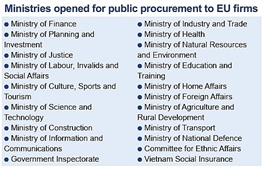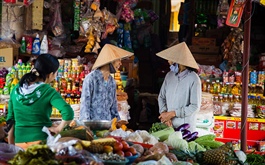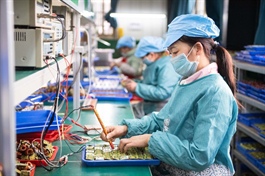Regional partnership to prove a tonic for ASEAN connectivity
Regional partnership to prove a tonic for ASEAN connectivity
As ASEAN chair this year, Vietnam is playing a crucial role in taking the bloc to the signing of the Regional Comprehensive Economic Partnership in 2020, and in improving the investment climate to woo intra-bloc and non-regional investments.
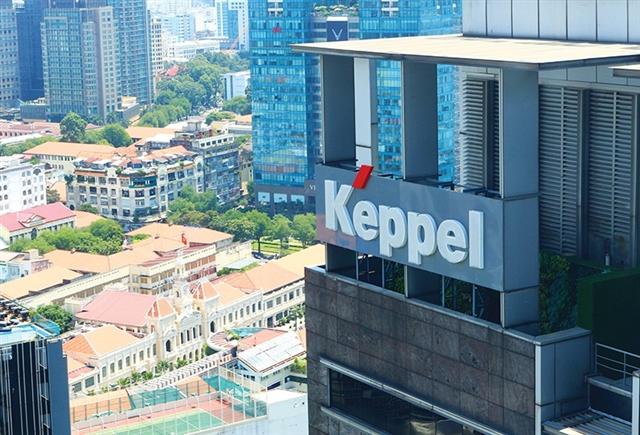
As of July 20, Vietnam attracted $81 billion in registered investment capital from ASEAN member states, Photo: Le Toan
|
Despite the prolonged pandemic affecting all ASEAN member states and in a bid to spur on regional economic growth and investment attraction, the whole bloc, under the leadership of Vietnam as ASEAN chair, is making great efforts to ink the Regional Comprehensive Economic Partnership (RCEP), a type of free trade agreement (FTA), with Australia, China, Japan, New Zealand, and South Korea.
India pulled out of the negotiations last year, saying that the deal was not set to provide adequate protection against possible surges of imported goods.
The agreement will almost certainly be inked at the fourth RCEP Summit on the sidelines of the 37th ASEAN Summit in November either in Hanoi or online, depending on the developments of COVID-19. The pandemic was two weeks ago forecast by Singapore-based ASEAN+3 Macroeconomic Research Office, a regional surveillance organisation, to cause a -2.6 per cent growth rate for East Asia this year. Almost all regional nations are predicted to suffer from below-zero growth, except for Vietnam (3.1 per cent) and China (2.3 per cent).
Once signed, the RCEP will be the world’s biggest such agreement, which will function as an engine for economic recovery for negotiating nations in the post-pandemic world.
The RCEP is regarded as the world’s largest regional trade agreement as it covers a market of 47.4 per cent (about 3.5 billion people) of the world’s population, accounts for 39 per cent (about $49 trillion) of global GDP, 29.1 per cent of global trade, and 32.5 per cent of global investment flows.
New growth engine
Currently no details of the RCEP are available, and senior officials from the involved nations are wrapping up legal squabbling before finalising the deal. They are confident that it will help accelerate the economic recovery of the whole East Asian region which is heavily affected by the health crisis when compared to the rest of the world. With the easing of lockdowns and travel restrictions in most parts of the region, East Asia’s economic recovery has been witnessing an earlier restart.
The deal will contribute to the planned ASEAN Comprehensive Recovery Framework currently under discussion by ASEAN leaders. It will help swell intra-ASEAN trade with East Asian economic powerhouses, by promoting supply chain connectivity in the new normal era.
Vietnam’s Minister of Industry and Trade Tran Tuan Anh stated that under Vietnam’s ASEAN chairmanship, the inking of the RCEP “will send a message that negotiating countries support a multilateral trade system, and increase economic integration among regional member states, therefrom contributing to recovering economic activities, and establishing a new normalcy in the whole region.”
According to a statement from the Ministry of Industry and Trade (MoIT), the 15 negotiating nations stressed that as a region-wide FTA, the RCEP will provide a more stable and predictable economic environment to support the much-needed recovery of trade and investment in the region, which has been adversely affected by the COVID-19 pandemic.
“Regarding India’s participation in the RCEP, all parties said that India is always an important member in the negotiation process, and its participation in the deal will contribute to the entire region’s progress and prosperity. They stress that the RCEP is quite open for India to join in,” read the statement.
Vietnam will benefit from the RCEP’s content. For example, the agreement’s e-commerce chapter facilitates related trade, which offers big opportunities for Vietnam. The chapter also embraces rules on consumer protection and personal information protection to protect Vietnamese consumers engaging in e-commerce.
The provisions will also enable Vietnam to regulate to achieve legitimate public policy objectives, for instance to ensure robust privacy and consumer protection safeguards, or implement measures in its essential security interests.
In another case, the inclusion of a chapter on government procurement reflects Vietnam’s ambition for the RCEP to be a modern and comprehensive FTA. The commitments are modest, and primarily on transparency and cooperation. The chapter provides a foundation on which to build closer economic ties concerning government procurement activity in the region.
As of July 20, total registered investment from RCEP-14 in Vietnam hit over $179.34 billion, including $81 billion from ASEAN member states, and over $98.3 billion from Australia ($1.9 billion), China ($21 billion), Japan ($60.2 billion), New Zealand ($209.5 million), and South Korea ($70 billion), according to Vietnam’s Ministry of Planning and Investment (MPI).
Spurring on attraction
While acting as ASEAN chair, Vietnam has and will continue calling for more investment from regional nations and the bloc’s partners into the region as ASEAN is developing a single market, according to Vietnam’s Ministry of Foreign Affairs.
“The values of ASEAN – as a common market and unified production base, an open space of travel and work, and a caring and sharing community – need to be widely disseminated and made known to all, so that our citizens and businesses shall all partake of them, and likewise contribute to the development of ASEAN,” stated Prime Minister Nguyen Xuan Phuc on the occasion of the 53rd anniversary of the founding of ASEAN and the 23rd anniversary of Vietnam’s accession to the bloc.
One of the key priorities of Vietnam as chair for the region is boosting regional economic connectivity and comprehensive linkages within the bloc and with partners via improving the regional investment climate to attract intra-bloc investment and non-ASEAN investment based on the regional shared spirit of constructing a single market and a shared production base.
This year Vietnam will complete removal of almost import tariffs imposed on goods imported from ASEAN member states, making it completely favourable for businesses to do business in the country, especially those investing in Vietnam and then exporting products to regional markets.
Notably, since the ASEAN Economic Community was established in late 2015, and as per the tariff cuts under the ASEAN Trade in Goods Agreement, Vietnam has been attracting a great deal of regional investments, and its trade ties with regional members have also improved.
Statistics from the MPI showed that in the first seven months of 2020, Vietnam expanded investments to some regional markets, such as Myanmar ($38.3 million), Laos ($24.7 million), Singapore ($19 million), and Cambodia ($15.7 million).
As of July 20, Vietnam attracted $81 billion in registered investment capital from ASEAN member states, including Singapore (over $55 billion), Thailand ($12.4 billion), Malaysia ($12.77 billion), Indonesia ($590.6 million), and the Philippines ($265.3 million).
The first seven months of 2020 saw Singapore making the largest investment in Vietnam with $4.57 billion registered for 139 newly-licensed projects, and Thailand with 19 newly-licensed projects registered at $136.7 million.
Notably, Singapore’s Delta Offshore Energy Pte., Ltd. was in February licensed by the Mekong Delta province of Bac Lieu to construct a $4 billion, 3,200MW power plant to be run by liquefied natural gas. The plant will have four turbines of 750MW each and one with a capacity of 200MW, the former to go on stream at the end of 2023 and the latter in 2027.
According to the MoIT, currently Southeast Asia is Vietnam’s fourth-largest export market after the US, the EU, and China. Vietnam’s export turnover from the region surged from under $1 billion in 1995 to $18.23 billion in 2015, and $17.45 billion in 2016. However, the figure ascended to $21.7 billion in 2017, $24.7 billion in 2018, and $25.3 billion last year, up 1.9 per cent on-year. In the first seven months of 2020, the figure hit $12.8 billion, down 15.2 per cent on-year.
Meanwhile, Southeast Asia is also Vietnam’s third-largest import market. The country’s import turnover from other member states totaled $23.7 billion in 2016, $28 billion in 2017, $32 billion in 2018, and $32.1 billion last year. The figure touched $16.7 billion in the first seven months of 2020, down 11.3 per cent on-year.







